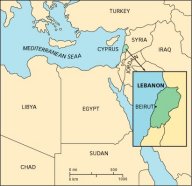


Of all the countries of the Middle East, Lebanon is probably the most cosmopolitan and its politics the most difficult to grasp.
Over many centuries, Lebanon, strategically located at the eastern end of the Mediterranean, has been a thriving trading center. Muslims, the Druze, Maronite Christians and Greek Orthodox Christians have all made their homes in Lebanon. On top of these diverse cultures have been imposed the colonial influences of the Ottoman Turks (who absorbed Lebanon into their empire in the sixteenth century and retained it until the end of the First World War) and the French (who administered the country under a League of Nations mandate until 1941 when Lebanon achieved independence).
Throughout the centuries of colonial rule, the different sections of Lebanese society, with their different cultures and traditions, lived together in relative harmony, with whatever power the Turks or French were prepared to devolve distributed amongst them. After independence, this delicate but practical balance was maintained and Lebanon concentrated on developing a dynamic economy, which, through the undoubted business acumen of its people, became the banking and commercial services center of the Middle East.

